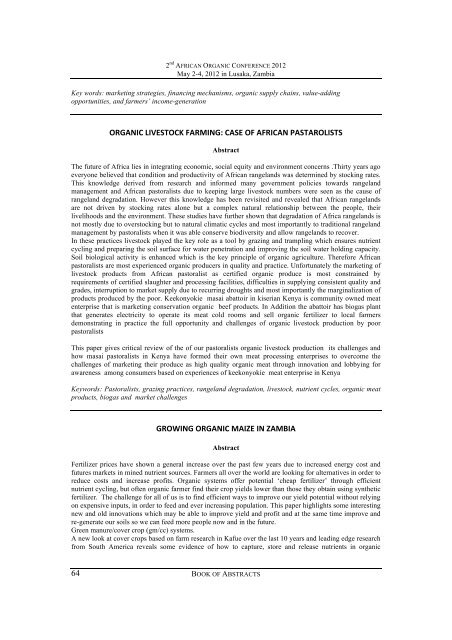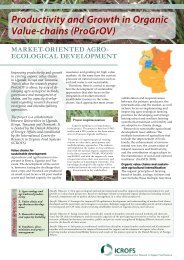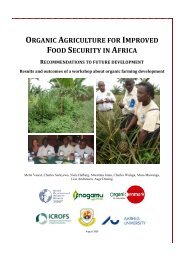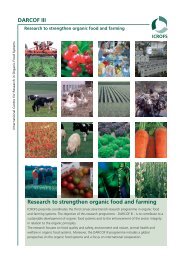The 2nd African Organic Conference â Mainstreaming ... - ICROFS
The 2nd African Organic Conference â Mainstreaming ... - ICROFS
The 2nd African Organic Conference â Mainstreaming ... - ICROFS
Create successful ePaper yourself
Turn your PDF publications into a flip-book with our unique Google optimized e-Paper software.
2 nd AFRICAN ORGANIC CONFERENCE 2012<br />
May 2-4, 2012 in Lusaka, Zambia<br />
Key words: marketing strategies, financing mechanisms, organic supply chains, value-adding<br />
opportunities, and farmers’ income-generation<br />
ORGANIC&LIVESTOCK&FARMING:&CASE&OF&AFRICAN&PASTAROLISTS&<br />
Abstract<br />
<strong>The</strong> future of Africa lies in integrating economic, social equity and environment concerns .Thirty years ago<br />
everyone believed that condition and productivity of <strong>African</strong> rangelands was determined by stocking rates.<br />
This knowledge derived from research and informed many government policies towards rangeland<br />
management and <strong>African</strong> pastoralists due to keeping large livestock numbers were seen as the cause of<br />
rangeland degradation. However this knowledge has been revisited and revealed that <strong>African</strong> rangelands<br />
are not driven by stocking rates alone but a complex natural relationship between the people, their<br />
livelihoods and the environment. <strong>The</strong>se studies have further shown that degradation of Africa rangelands is<br />
not mostly due to overstocking but to natural climatic cycles and most importantly to traditional rangeland<br />
management by pastoralists when it was able conserve biodiversity and allow rangelands to recover.<br />
In these practices livestock played the key role as a tool by grazing and trampling which ensures nutrient<br />
cycling and preparing the soil surface for water penetration and improving the soil water holding capacity.<br />
Soil biological activity is enhanced which is the key principle of organic agriculture. <strong>The</strong>refore <strong>African</strong><br />
pastoralists are most experienced organic producers in quality and practice. Unfortunately the marketing of<br />
livestock products from <strong>African</strong> pastoralist as certified organic produce is most constrained by<br />
requirements of certified slaughter and processing facilities, difficulties in supplying consistent quality and<br />
grades, interruption to market supply due to recurring droughts and most importantly the marginalization of<br />
products produced by the poor. Keekonyokie masai abattoir in kiserian Kenya is community owned meat<br />
enterprise that is marketing conservation organic beef products. In Addition the abattoir has biogas plant<br />
that generates electricity to operate its meat cold rooms and sell organic fertilizer to local farmers<br />
demonstrating in practice the full opportunity and challenges of organic livestock production by poor<br />
pastoralists<br />
This paper gives critical review of the of our pastoralists organic livestock production its challenges and<br />
how masai pastoralists in Kenya have formed their own meat processing enterprises to overcome the<br />
challenges of marketing their produce as high quality organic meat through innovation and lobbying for<br />
awareness among consumers based on experiences of keekonyokie meat enterprise in Kenya<br />
Keywords: Pastoralists, grazing practices, rangeland degradation, livestock, nutrient cycles, organic meat<br />
products, biogas and market challenges<br />
GROWING&ORGANIC&MAIZE&IN&ZAMBIA&<br />
Abstract<br />
Fertilizer prices have shown a general increase over the past few years due to increased energy cost and<br />
futures markets in mined nutrient sources. Farmers all over the world are looking for alternatives in order to<br />
reduce costs and increase profits. <strong>Organic</strong> systems offer potential ‘cheap fertilizer’ through efficient<br />
nutrient cycling, but often organic farmer find their crop yields lower than those they obtain using synthetic<br />
fertilizer. <strong>The</strong> challenge for all of us is to find efficient ways to improve our yield potential without relying<br />
on expensive inputs, in order to feed and ever increasing population. This paper highlights some interesting<br />
new and old innovations which may be able to improve yield and profit and at the same time improve and<br />
re-generate our soils so we can feed more people now and in the future.<br />
Green manure/cover crop (gm/cc) systems.<br />
A new look at cover crops based on farm research in Kafue over the last 10 years and leading edge research<br />
from South America reveals some evidence of how to capture, store and release nutrients in organic<br />
64<br />
BOOK OF ABSTRACTS





